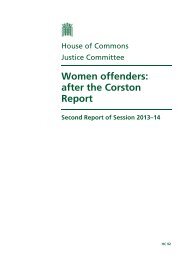Minority voices: Research into the access and acceptability of ... - MMC
Minority voices: Research into the access and acceptability of ... - MMC
Minority voices: Research into the access and acceptability of ... - MMC
- No tags were found...
You also want an ePaper? Increase the reach of your titles
YUMPU automatically turns print PDFs into web optimized ePapers that Google loves.
• The need for awareness raising about mental health - this is agreed to be an essentialfirst step towards young people having <strong>the</strong> underst<strong>and</strong>ing <strong>and</strong> confidence to approachservices.• The importance <strong>of</strong> information sharing - <strong>of</strong> more detailed information about CAMHS <strong>and</strong>o<strong>the</strong>r services able to support young people - <strong>and</strong> <strong>the</strong> greater use <strong>of</strong> non-traditionalroutes for dissemination.• The need for services to explore <strong>and</strong> develop more flexible ways <strong>of</strong> more promptlydelivering mental health services - including attention to using different venues,opening times, support through o<strong>the</strong>r routes such as <strong>the</strong> telephone <strong>and</strong> email <strong>and</strong> <strong>the</strong>removal <strong>of</strong> restricted referral pathways, which both young people <strong>and</strong> staff alikerecognise as a significant barrier to service uptake.• The value <strong>of</strong> having diverse staff groups in CAMHS able to speak different languages<strong>and</strong> with good levels <strong>of</strong> underst<strong>and</strong>ing <strong>of</strong> different religious <strong>and</strong> cultural needs - <strong>and</strong>crucially, attitudes <strong>and</strong> approaches that are empa<strong>the</strong>tic to <strong>the</strong> needs <strong>of</strong> young peoplefrom Black <strong>and</strong> minority ethnic groups which are not based on assumptions about socalled ‘typical’ young people, but treat young people as individuals with individualcircumstances, experiences <strong>and</strong> needs.• The key role played by <strong>the</strong> voluntary sector <strong>and</strong> <strong>the</strong> need for continuing efforts indeveloping multi-agency <strong>and</strong> partnership approaches <strong>and</strong> work through differentcommunities. Alongside this <strong>the</strong> importance <strong>of</strong> service networks so that young peopledo not get ‘passed around’ but are able to have <strong>the</strong>ir needs addressed in a coherentfashion.• The need to bear in mind information sharing with parents <strong>and</strong> o<strong>the</strong>r family members,<strong>and</strong> for services to develop skills in working with inter-generational issues <strong>and</strong>pressures.Learning from <strong>the</strong> study<strong>Minority</strong> Voices participants had many suggestions for how CAMHS could be improved <strong>and</strong> alsohow information about services could be made more ‘young person friendly’ <strong>and</strong> effectivelydisseminated. Already, YoungMinds has taken up some <strong>of</strong> <strong>the</strong>se suggestions in <strong>the</strong> range <strong>of</strong>leaflets produced for young people <strong>and</strong> it is to be hoped that o<strong>the</strong>r organisations in this fieldwill also take an interest in developing o<strong>the</strong>r similar materials.The accompanying guide to ‘good practice’ has been written with practitioners in mind <strong>and</strong>draws on <strong>the</strong> data ga<strong>the</strong>red from <strong>the</strong> research study. Many <strong>of</strong> <strong>the</strong> services presented as casestudies in this publication are extremely well used by young people from Black <strong>and</strong> minorityethnic groups <strong>and</strong> it is to be hoped that o<strong>the</strong>r services will be able to take from this documentideas <strong>and</strong> approaches that can help <strong>the</strong>m develop <strong>the</strong>ir work in this area.RecommendationsThe recommendations from <strong>the</strong> <strong>Minority</strong> Voices study derive from <strong>the</strong> key issues raised from<strong>the</strong> interviews <strong>and</strong> focus groups, namely: information about mental health services, staffawareness <strong>and</strong> training <strong>and</strong> <strong>the</strong> style <strong>of</strong> service delivery <strong>of</strong>fered by specialist CAMHS.From <strong>the</strong> mapping <strong>of</strong> provision across <strong>the</strong> country <strong>and</strong> also <strong>the</strong> views <strong>of</strong> many young peoplewho participated in <strong>the</strong> study, <strong>the</strong> crucial role <strong>of</strong> <strong>the</strong> voluntary sector in providing flexible,<strong>access</strong>ible <strong>and</strong> acceptable forms <strong>of</strong> support to young people from minority ethnic communitieswas clearly shown <strong>and</strong> forms <strong>the</strong> basis <strong>of</strong> a fur<strong>the</strong>r recommendation. The need for training <strong>and</strong>awareness-raising for frontline voluntary sector staff in recognising emotional difficulties <strong>and</strong>referring on where appropriate, links to this.<strong>Minority</strong> Voices <strong>Research</strong> Report43
















